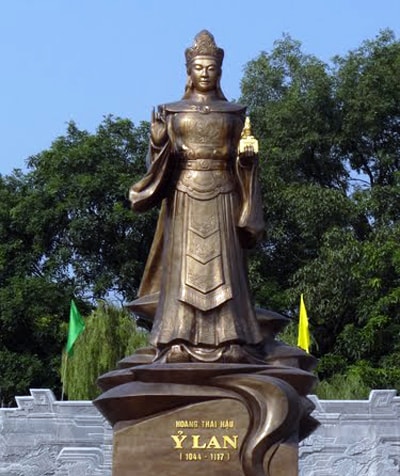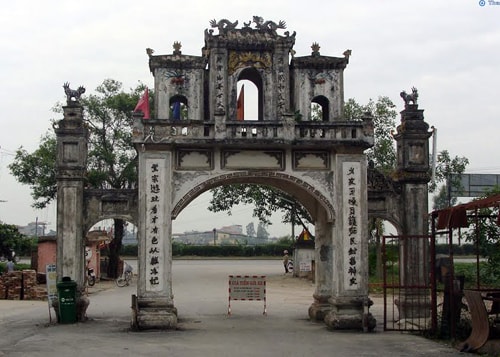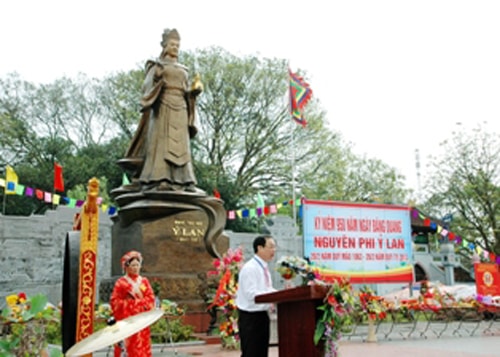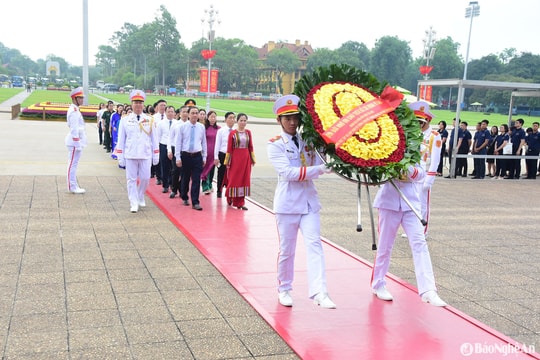Strawberry Picker Becomes the Most Powerful Woman in Vietnamese History
Born as a country girl picking mulberries, Y Lan became one of the most powerful women in Vietnamese history when she twice took over the king's government, helping the country prosper.
 |
| Statue of Queen Mother Y Lan at Linh Nhan Tu Phuc Tu Pagoda in Gia Lam, Hanoi. Photo: Panoramio |
Y Lan's real name is Le Thi Yen (some books also record her as Le Thi Yen Loan or Le Thi Khiet), born in 1044, was a girl who picked mulberries and raised silkworms in Tho Loi village, on the outskirts of Thang Long during the Ly dynasty (now Duong Xa commune, Gia Lam district, Hanoi).
According to old history, in the spring of 1063, King Ly Thanh Tong was 40 years old but still had no son, so he went to pray for a child in all the temples and pagodas. When the king passed by Dau Pagoda (Thuan Thanh district), the villagers came to see him excitedly, but only his 19-year-old daughter was still calmly picking mulberries next to the orchid tree.
The king summoned her and asked why she did not welcome him. She replied: "I am from a poor family and have to work hard to support my parents. How could I dare to expect to see the procession and see the dragon's face?" The king was so impressed that he brought Yen back to the palace and appointed her as Lady Y Lan (the word "y lan" means leaning against an orchid tree).
This, Dai Viet Su Ky Toan Thu book recorded: "According to legend, the king (Ly Thanh Tong) prayed for a child but did not see any results, so he went to visit many temples and pagodas. Wherever the royal carriage went, boys and girls flocked to watch without stopping, only one girl who was picking mulberries kept standing leaning against the orchid bush. The king saw her, called her to the palace, and was loved by the king and was given the title of Y Lan phu nhan..."
Y Lan did not polish her beauty to win the king's favor but cared about court affairs. She studied hard and read books diligently, so in a short time she had profound knowledge in many aspects, making everyone surprised and admired.
Three years later, Y Lan gave birth to a prince named Can Duc (later King Ly Nhan Tong). The king loved her even more and appointed Y Lan as Nguyen Phi - the head of the concubines, second only to the queen, and her son was made crown prince.
In 1069, King Ly Thanh Tong led troops to attack Champa in the South. Although the court had Prime Minister Ly Dao Thanh and Queen Thuong Duong, the king only trusted and gave the regency to Royal Consort Y Lan, meaning she had full authority to make decisions when the king was absent.
Going to battle, Thanh Tong fought but could not win, so he retreated. When he brought his army back to Cu Lien district (Tien Lu, Hung Yen), he heard that Royal Concubine Y Lan governed the country very well, making the people harmonious and the country peaceful. The people loved her and honored her as "Quan Am". Thanh Tong said: "Royal Concubine is a woman and can do that, why can't I, a man, do the same?" Then he ordered his army to turn back and continue fighting and won a resounding victory.
 |
| Temple gate in memory of Queen Mother Y Lan. Photo: Panoramio |
In 1072, King Ly Thanh Tong suddenly passed away, and Crown Prince Can Duc ascended the throne at the age of 7. The Ly Dynasty could not avoid turmoil. However, when Y Lan became the regent queen mother, Dai Viet quickly stabilized. She implemented measures to build the country and pacify the people, making the country stronger. Thanks to that, in 1077, when the Song Dynasty sent a large army to invade, Y Lan mobilized the entire nation to unite and defeat the enemy.
According to historians, Queen Mother Y Lan knew how to put national interests above personal grudges. She put aside old grudges and summoned Ly Dao Thanh (who was on the side of Queen Mother Thuong Duong) to the capital to take care of domestic affairs so that Ly Thuong Kiet could focus on fighting foreign invaders. Under Y Lan's rule, the court had Ly Dao Thanh in the civil service and Ly Thuong Kiet in the military, so the country prospered.
In 1103, Queen Mother Y Lan used money from the royal treasury to redeem poor daughters who were sold to work as servants for rich families and then married them to widowers. Discussing this event, historian Ngo Si Lien said: "Daughters so poor that they have to work as hired servants, and sons so poor that they have no wives are the same as the common people of the world. The Queen Mother changing their fate is also a righteous act!"
According to historical records, Y Lan not only improved the country's affairs, strengthened the army, and took care of the people's education, but also issued many laws that benefited the country and the people. She advised the king to do good and punish evil. She understood the hardships of farmers without buffaloes to plow, so she told the king to severely punish those who stole buffaloes and killed them indiscriminately.
She was not only good at state affairs, but also took care of family affairs when she trained a wise king like King Ly Nhan Tong. Historical books all recorded the country's prosperity in all aspects under the reign of Ly Nhan Tong. In particular, in 1075, the court opened the three-level examination, the first examination in our country. One year later, the court established the Imperial Academy, considered the first university in our country. The Confucian education of Vietnam began from there.
 |
| The traditional festival of Princess Y Lan Temple and the 950th anniversary of Princess Y Lan's coronation were held over 3 days, March 30, 31 and April 1, 2013. Photo: gialam.gov.vn |
Y Lan's outstanding political talent can be summarized through her answer when King Thanh Tong asked about governing the country, recorded in history as follows: "If you want the country to be rich and the people to be strong, the important thing is to know how to listen to the advice of loyal ministers. Honest words may be unpleasant to hear but are beneficial to work. Bitter medicine is hard to drink but can cure illness."
However, despite being a person who contributed greatly to the prosperity of Dai Viet under the Ly Dynasty, Y Lan had a "stain" that was criticized by historians and she herself was said to have deeply repented of her sins, so she accumulated virtue, did good deeds and built many pagodas until the end of her life.
That was when King Ly Thanh Tong passed away, Crown Prince Can Duc (Ly Nhan Tong) ascended the throne, according to the law, Queen Thuong Duong was appointed Queen Mother, allowed to participate in court affairs because the king was still young. As for Y Lan, she was only honored as Thai Phi, not allowed to interfere in court affairs.
But with the advantage of being the king's biological mother, and the help of Grand Chancellor Ly Thuong Kiet, she forced Nhan Tong to issue an edict to depose the Empress Dowager Thuong Duong and imprison her in the cold palace with 72 other palace maids. When the funeral of Emperor Thanh Tong was held, the Empress Dowager and the palace maids were forced to be buried with her. After that, King Nhan Tong appointed Y Lan as Linh Nhan Empress Dowager to take the power behind the curtain and rule as regent.
In 1117, Queen Mother Y Lan passed away at the age of 70. King Nhan Tong gave her the posthumous title Phu Thanh Linh Nhan Hoang Thai Hau. Her main temple is located in Gia Lam, Hanoi, at the "Linh Nhan Tu Phuc Tu" pagoda (commonly known as "Ba Tam pagoda"), which she built two years earlier. Since then, this temple complex has been a place to worship Buddha and also a place to commemorate her.
According to VnExpress
| RELATED NEWS |
|---|



.jpg)



